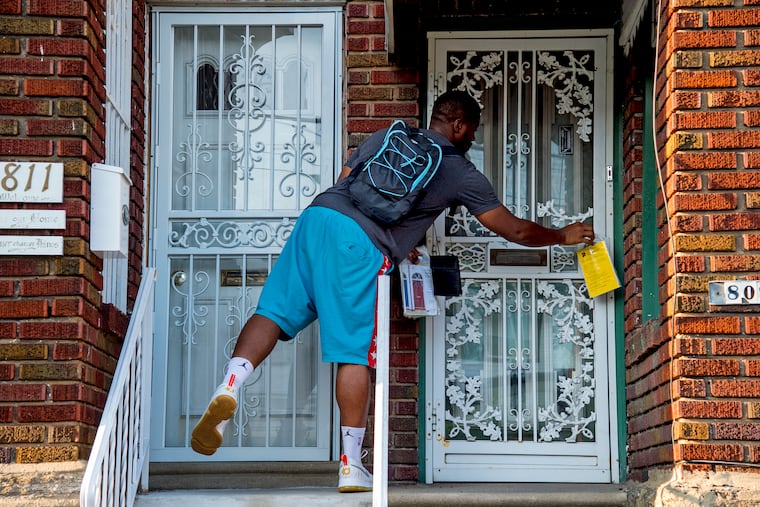Should property tax canvassers also register Philadelphians to vote? | Editorial
If the city is already invested in getting canvassers to the doors of Philadelphians, can they also register them to vote?

Almost 4,000 city residents opened their doors this summer to an unexpected visitor: a canvasser sent by the Department of Revenue telling them ways they can decrease their property tax bill. The city deserves kudos for this important effort. But if Philadelphia was already invested in getting canvassers to knock on doors, why not take the outreach one step further and register people to vote?
The outreach had an important purpose: bringing information about potential savings to homeowners who may have been surprised to see their 2019 property tax bill significantly increase in April, following the city's new assessment process.
When the city overhauled the property tax and assessment system during the Mayor Nutter administration, it put in place programs to help homeowners pay their property taxes. The programs, however, are underutilized. For example, even though every owner-occupied house can exempt $40,000 from their home's value for tax purposes by filling out a simple form, only 77.5 percent of eligible households claimed the Homestead Exemption in 2018, according to the Department of Revenue. That means more than 62,000 households could have saved an average of $550 on their property tax bill but didn't.
To increase the participation rate in these programs, the Department of Revenue hired a marketing consultant to run a pilot program and visit six neighborhoods — Cobbs Creek, Lower Moyamensing, Feltonville, West Oak Lane, Kensington, and Harrowgate. A team of people has been knocking on doors, offering homeowners information about assistance programs, all summer, ahead of the Sept. 13 registration deadline.
According to the Department of Revenue, it was important to keep the conversation focused on the assistance programs to be able to evaluate the pilot. If the pilot proves successful, more topics should be added to the canvassers' script — including voter registration.
Voting is a right, and all citizens should be able to participate on election days. Philadelphia could become a city in which any city employee who comes in contact with the public will be able to offer voter registration information — from the Water Department service representative to the person helping you save money on your tax bill.
As of May's primary election, there were 1,035,420 registered voters in Philadelphia — about 60,000 fewer than on the eve of the 2016 general election. At the time, Billy Penn estimated that more than 200,000 eligible Philadelphians were not registered to vote.
The city has made efforts to register voters. Both the Mayor's Office of Public Engagement and the Office of the City Commissioners register voters who recently moved to senior citizens homes; they also reach out to high school students and hold registration drives.
Just like the Department of Revenue decided that more can be done to increase participation in property tax assistance programs, more can be done to increase participation in elections. The first step is being registered.